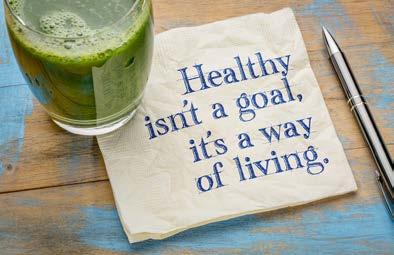

Weight Loss as a Lifestyle Rebuilding From Trauma With Amanza Smith Identify Your Food Psychology and Triggers Using Cravings to Your Healthy Advantage 2Inspirenutrition.com ISSUE 43 FREE Healthy Weight Loss Starts with a Mind Shift Explore How Your Family Played a Role in Your Relationship With Food Identify Your Physical Signals that it’s Time to Exercise
INSIDE THIS MONTH’S ISSUE
Weight Loss as a Lifestyle - pg. 3

Identify Your Food Psychology and Triggers - pg. 5
Rebuilding From Trauma With Amanza Smith - pg. 10
Using Cravings to Your Healthy Advantage - pg. 16

Identify Your Physical Signals that it’s Time to Exercise - pg. 19
Explore How Your Family Played a Role in Your Relationship With Food - pg. 23
Healthy Weight Loss Starts with a Mind Shift - pg. 26
2
Why do so many people lose weight only to gain it back later?

Legitimate question, and certainly a common problem.
One of the biggest hurdles to overcome when trying to lose weight is thinking of the good health practices you’ll adopt as only being temporary.
We don’t always KNOW we’re doing this. But it’s the reason why so many people yo-yo from
Weight Loss as a Lifestyle
overweight to fit and back again.
Basically, this is about the word diet.
Diet has come to mean something that we only do when we hope to actively decrease the number on the scale.
Diet is often thought of as a change in eating and exercise habits in order to trim down a bit for an occasion where there will be lots of memories made and pictures taken.
Something like a special vacation, wedding, (either yours or someone else’s)… these are all situations where we might decide we’re going on a “diet” leading up to the big day, weekend, week, phase of life, etc.
Diet can also mean something you rush into after going to the doctor and getting a worrisome blood test read out and realizing it’s time to get healthy again.
The general idea is that
3
once we reach the desired weight loss outcome, we get to fit into that special outfit, pose for the pics, sport the new wardrobe, rock the bikini, lower the blood pressure etc.
Then what happens?
The special moment passes. The notion of working to maintain that trim physique quickly drops from our priority list. We’ve checked off the goal and we celebrate the victory with an indulgent weekend.
It doesn’t take long to backslide into our version of “normal” eating and “normal” activity levels. Then we return to our prediet lifestyle.
We habitually overindulge in the wrong foods, munch, drink, late-night snack, and slack off on exercise just like we were doing before the word
diet ever left our lips.
The obvious outcome? After the “diet” ends, your back right where you started, barreling toward regaining the weight you worked so hard to take off in the first place.
Why Do We View Diets as Temporary?
How come it’s so tough to maintain healthy weight loss practices? Why is good nutrition something we only emphasize when there’s a motivating factor... like wanting to impress a crowd, or being on show for one reason or another?
One person’s reasons may be a bit different than another person’s. But it all comes back to this. We got stuck in a cycle of limited thinking. We have very likely fooled ourselves into
believing that we can quit those healthy changes once we hit the goal. What we fail to see is that the whole reason why we needed the changes in the first place was because what we were doing before wasn’t working.
So if we go back to what we were doing before, we will DEFINITELY gain all the weight back.
Think about this:
Healthy living is purely a mindset. You must change the mind if you expect lasting results. If you don’t, you’ll be forever on that yo-yo dieting cycle. And most of us are... for our whole lives.
Clearly this is total weight loss sabotage, and the reason so many of us can’t get off the weight loss merry-go-round of gaining and losing and gaining and losing over and over.

4
Thinking of weight loss as temporary means that no matter how many times you diet, you’re always going to end up back where you started in terms of your health and weight.
So how do you end the cycle? It starts with awareness.
A person who is truly committed to making healthy lifestyle changes should take a closer look at their own lifestyle, and maybe even go a bit deeper into their personal psychology of food and eating.
Once you identify the reasons, you’ll be able to make small but significant changes in your daily life that result in a permanent weight reduction and healthier, fitter and happier you.
Not a “diet,” but a way of life!
Here are some possible reasons why you may find it difficult to move past “diet” and settle into a permanent healthy lifestyle change.
Reason 1: You haven’t made the mental shift.
awakening. To make the shift, we must undo what we thought we knew. This takes work!
Reason 2: Family influence runs deep.
This is about how family shapes our thoughts, feelings, habits and attitudes around food and eating, and yes, even exercise, over the course of our lives.
Reason 3: Old eating habits die hard.
If you were raised to regard food in a certain way, then it’s going to be pretty difficult to break those habits when deep in your psyche you are locked into all the wrong ways to live healthy.
Reason 4: You may lack information.
Many people were not taught the basics of good nutrition and the need for regular exercise. Either that, or you were schooled on these subjects, but the information just didn’t sink in the way that it needed to.
thoughts, words and daily practices of whomever we surround ourselves with. If yours is a sedentary crew, it’s going to be harder to maintain that get-upand-go that will see the number on the scale dropping lower.
Reason 6: Disconnection.
We haven’t made the connection that we’ve been doing it wrong all this time. Our view of how to eat, and how much activity to participate in, feels “right” for us because it’s what we’ve always known.
Telling people you’re on a “diet” sends a message of temporary deprivation. It’s come to mean that you will deny yourself the things you love to eat until you reach the weight loss goal. But then when you’re done you’ll just resume the way you were doing it before.
We’re here to break this, and break the cycle once and for all.
Getting and staying slim requires a total mental
Reason 5: Absence of role models.
We tend to adopt the
5
Identify Your Food Psychology and Triggers
One problem that keeps us stalled in our weight loss goals is the emotional component of hunger. Sometimes our body isn’t necessarily hungry, but those food psychology triggers get tripped. We find ourselves in a challenging personal situation. The first instinct is to reach for the nearest processed, sugary and/or high-fat snack or fast-food meal.

Do you know what brings on strong cravings for you?
It’s different for everyone, and the tolerance will vary from one person to the next. But these types of situations can definitely put the kibosh on your weight loss and healthy eating plan if you’re not prepared to meet them head on.
Stress eating. Pure stress... a day filled with activity and no breaks. Rushing around, having to solve problems on the fly. Encounters
with aggressive people... mistakes being made, mishaps, putting out fires. We all have stress to deal with. When you’re faced with it, and you’re trying to eat less and stay on plan with healthy choices, what do you do? Those cravings are powerful... you’re starting to feel snappish, slightly sick, with a headache coming on and a ravenous feeling.
The best way to approach meals and snacks on a potentially stressful day
6
or week is to be prepared. People who often choose the wrong foods that cause weight gain do so because they don’t have a healthy eating plan in place.
Stock your kitchen with healthy take-along meals and snacks. Make this a lifestyle, not an occasional habit. Buy a lunch box and some small containers to fill with fresh veggies and fruit, healthy protein like hummus, hard-boiled eggs or lean meat, wholegrain breads and crackers.
If you do this on a regular basis and establish a routine (example, packing the food bag in the evening each night before bed, so you can grab it and go in the morning), you’ll have healthy choices when hunger hits on a stressful day.
Emotional eating.
Some people do well once they change their eating habits and approach to food prep. They’re on track with losing weight, exercising and getting fit. But what happens when something triggers strong emotions?
accident. Marital discord... the big, scary kind. Your relationship is ending... you just found out a close family member has a serious illness.
Usually this is the breaking point for people who are trying to lose weight. When circumstances disrupt your life, it’s hard to fit in time for exercise, let alone stocking and prepping healthy foods. You’re likely to go straight for the most fattening foods available.
“Comfort food” is called this for a reason. Your nervous system wants that sluggish, satiated feeling that you get from mac and cheese, pizza and cake. But we know that ultimately this affects the number on the scale, the blood test results.
when life is spiraling out of control is to increase consumption of lean protein. The body needs more protein when our nervous system is being assaulted and overburdened. Once you’ve curbed that ravenous feeling with some healthy protein, try to resume your plan to fill up on fresh produce.
Continue exercising even if you don’t think you have time anymore. You might need to modify or downgrade the plan, and that’s okay. Example: maybe instead of driving to and from the gym for an hour-long session, your workout now consists of jogging a quick mile each afternoon. Even, so, it’s worth continuing to exercise and get stress hormones out of your system.
Big problems in your family... a sudden car
Is there a way to stay the weight loss course when your life seems to be falling apart? Recognizing the stress for what it is could be the first step. Start by acknowledging the feelings. Give yourself permission to feel them in the first place. What is stress? Your muscles are holding onto tension. One way to rescue your healthy eating plan
Insomnia.
Insomnia can be another weight loss saboteur. Sleep patterns take us in a cycle. If we get thrown off balance, being stuck awake for much of the night can make us lethargic and unmotivated during the day. After a night of poor sleep, by 1 pm we might be feeling like eating a big, greasy
7
cheeseburger and then drifting off for a nap.
Keeping up with a moderate healthy eating and exercise plan will help us feel tired at the end of our day. It’s more difficult if you haven’t slept well the night before. But resisting the urge to nap and expelling your stress in a healthy way can stop the insomnia pattern from contuing.
If you get hungry before bed and can’t seem to fall asleep because of it, try a small snack of crackers with plain yogurt dip or something similar.
Best foods to keep in the house to stop emotional trigger and stress related cravings:

Nuts. In small amounts, nuts can be a healthy and filling way to nourish the body and stave off cravings. Sprinkle walnuts atop your fresh salad. Mix
a tablespoon of peanut butter into plain yogurt. Keep nuts in a container in your car or purse, and snack on a handful when you need to refuel.
Hard boiled eggs. These make a great take-along snack. Store one or two per Ziplock bag in the fridge, to add to your lunch box in the morning.
Cooked, lean meat like chicken or turkey breast. Cold cuts tend to have a lot of sodium and sugar added. Your best choice is to buy packaged meat from the butcher’s section of your grocery store. Cook and store, then portion out as needed for lunches and dinners. Dice up and add to a salad. Enjoy on whole-grain bread with healthy fixins like lettuce and tomato.
Plain, nonfat Greek yogurt. (If you’re eating low-carb choose full-fat). Nonfat Greek yogurt is surprisingly filling, due to the straining process in making this type of yogurt. Add a sprinkle of garlic powder and dill, with a bit of salt and pepper. Enjoy as a healthy dip with carrot, celery and
cucumber slices.
Tuna and salmon. Cans of tuna, or cooked salmon that’s portioned out for a quick lunch, can be a lifesaver when you’re eating for healthy weight loss. These fish are packed with nutrition and good fats for neuro and brain health. Enjoy with a fresh salad and a few wheat crackers for lunch. Or serve with whole grain brown rice and a side of colorful veggies for dinner.
Beans and legumes. Stock your pantry with cans of nutritious, delicious, filling beans. Portion out some in containers and make a quick burrito with a whole-grain wrap, for dinner. Blend up with olive oil, lemon juice and seasonings to make a homemade bean dip.
Hummus and bean dip.
When you don’t have time to make food from scratch, a tub of healthy hummus or bean dip can be a lifesaver. Add some to small containers and pack a lunch/snack of sliced veggies and whole grain crackers. Stop hunger in its tracks... deliciously and nutritiously.
8


Rebuilding From Trauma With Amanza Smith

10
This month, we spoke with Amanza Smith, star of Netflix’s “Selling Sunset.” She talks to us about reaching out for help and finding strength in traumatic experiences. A model, luxury real estate agent, interior design specialist, and, most importantly, a parent of two, Amanza recently opened her inbox to collaborations at teamamanza@gmail.com.
Dennis Postema: Can you walk us through your life journey, starting with your childhood?
Amanza Smith: I always wanted to share my story. I want to help others who have been through similar experiences. Hopefully, my sharing gives others the courage to talk about their experiences sooner rather than later. There are a variety of outlets you can go to for help. You do not have to struggle.
I did not share my story for years, even to friends or family. There were periods when I self-medicated. I experienced bouts of depression. I did not know why my anxiety was so severe.
From ages three to eleven, I was sexually molested by my stepfather and his father. My mom was also very mentally and physically abusive, so there was just never a safe space when I was a kid growing up. I never felt safe enough to talk to anybody about what was happening. There was nowhere for me to turn.
When I moved to Los Angeles, California, at twenty-four years old, I thought I was ambitious, courageous, and spontaneous.
Now that I am aware of my complex post-traumatic stress disorder, I realize I was always running away and trying to start over. I abused substances in my twenties to self-medicate.
I thought I was fine.
You don’t know at the time. I thought only war veterans suffered from post-traumatic stress disorder. I didn’t know what complex PTSD was.
I knew I had a crappy childhood, but I didn’t know all of the effects it had had on me.
Dennis: When did you realize the severity of the abuse you suffered?
Amanza: When I became a parent, everything started clicking. I saw things differently. I thought about what I would do if this or that happened to my child. It opened my eyes to how severe my abuse had been and how many issues it caused.
I lived with my mother and stepdad growing up. I didn’t tell my mom what had happened with my stepdad until I was nineteen years old. When she found out, they separated.
For so many years, I longed for a dad. I pretended the abuse didn’t happen for years to maintain the relationship. My stepdad walked me down the aisle at my wedding with my ex-husband. At that point, I had not even told my then-husband about what happened. I knew he would never want to be around my family if I did.
When I was pregnant with my oldest child, Noah, I knew I would never allow her to be alone with my
stepdad. I knew that no matter how much I shoved down what had happened, I could not let her be alone with him. I started thinking of all these scenarios. How uncomfortable was this going to be? How could I manage this without my husband aware to keep her safe? I thought maybe we just wouldn’t visit my family often.
When I thought about it like that, it started dawning on me.
But it wasn’t until I was six or seven months pregnant with Braker, my second child, that it really hit me, like, “Holy shit.”
I was with my stepdad, my best friend, and my best friend’s children. My stepdad was talking to my friend’s kids. I pictured everything that had happened to me happening instead to my daughter.
Suddenly, I couldn’t breathe. It felt like I was having a heart attack. I wanted him to stop talking to my friend’s daughters, to stop touching them, and I thought, “Holy shit, I
am not OK. What if all this happens to my daughter?”
Every ounce of anger that I should have felt from a young age exploded in that one moment.
I flew back to LA, told my husband, and started meeting with a therapist for the first time. I wrote my stepdad an email, telling him we would no longer be part of his life, explaining my reasons, and told him that his father had also molested me.
At that moment, I had woken up.
From there, I found my biological father on social media and reached out to him.
To this day, I am in trauma therapy weekly.
I recently saw a neurologist. They are going to scan my brain to figure out where it is most affected by this trauma based on how bumpy the brain is and how much or how little blood flow is going to different sectors of the brain. They’re going to prescribe me
supplements to heal the most impacted parts.
For nine years, I took medication for anxiety and depression. I stopped taking the medication over a year ago, but there are still parts of my brain that need healing. I’m very excited to try these supplements.
Dennis: How have you built up your mental health? How do you help others do the same?
Amanza: Medication was necessary for me. I am a firm believer in pharmaceuticals. Many people need them, and it’s fine to take them.
One day, I ran out. I procrastinated on getting more. A few weeks passed, and my body adjusted. At first, it was difficult, but I managed.
I was in therapy for all nine years that I took medication for anxiety and depression, whether through a spiritual life coach, a trauma therapist, or a psychiatrist. I went to trauma camp for a week for intense therapy. I have worked hard and talked to
12
many people to get a clear view of what has been going on in my brain, so I no longer needed the medication. Now, I am able to talk myself down from the ledge, breathe through it, and pray. Those methods work for me.
There are stretches, sometimes for several days, where I’m feeling down or triggered.
Recently, I had a situation with my preteen son I was not prepared for. He had lied to me. I reprimanded him and came up with a consequence. It triggered things in my head about his dad being gone. I wondered if I was too soft on my son, and I struggled to come up with a good consequence for what he had done.
On top of that, I was upset with my kids’ father because I am parenting them alone. I felt like I had failed because my son had lied—which, kids lie, it’s totally normal.
Despite my feelings, I did not allow myself to fall too low. I slept in late the next day. I felt physically tired, but there was no reason
for me to be that tired. I am starting to recognize when I am feeling low, and then I can stop myself from sinking deeper into it.
Dennis: What are some healthy coping mechanisms you use?
Amanza: It’s not the healthiest thing, but once in a while, I love to bingeeat ice cream, watch movies, and sleep. It’s not the worst thing if you aren’t doing it every single day.
As for actual healthy coping mechanisms, I do breath work and meditation. Breathing techniques are really simple. Recently, I started taking acting classes. In my first class, the instructor taught me some breathing techniques to be present during a scene. I thought, “This is almost like therapy.”
Notice yourself breathing. Focus on your breath. Think, “I’m breathing. There is air going through my nose. It’s filling up my lungs. It’s coming out of my mouth.”
You can feel your body breathing. If you focus on it, all of the chatter in your head disappears, and you are present in the moment.
I always have meditative, calming music playing in the background.
When I wake up, I pray. “Thank you, God, for another day.”
That’s the very first thing in my mind.
Everyone has different beliefs, and that’s OK. Whether you believe in the universe, God, Spirit, Allah, or whatever else, have faith that life is going to be OK, everything happens for a reason, you’re going to get through it, and sometimes you have to let go.
I have a tattoo on my neck that says, “Let go, let God.”
Over time, I have learned that I am not in control of everything. I accept what I’m not in control of, and I work through the rest the best that I can.
Affirmations are another important coping
13
mechanism. When my children were little, we’d sit at breakfast and they’d repeat affirmations. I’ve seen videos of parents teaching their children affirmations like, “I am beautiful, I am brave, I am smart, I am confident, I am enough.”
You have to tell yourself those things and teach them to your children.
When negative thoughts or self-doubt pop into my head, I write them down on a piece of paper, wad it up, and toss it in the trash. Doing that gets the nasty thoughts out of my head and resets my brain.
Dennis: As a parent, model, entrepreneur and so many other titles, how do you stay mentally and physically fit while holding your life together?
Amanza: I have been genetically blessed in terms of physical fitness. I know I should work out, and I have tried multiple times. I get into a groove, I feel amazing, and then I fall out of the groove.
There is a person I am and
a person I want to be. The person I want to be wakes up at 5:30 a.m. and makes a smoothie or fasts until they work out.
But I’m not quite there yet. Just as I believe in manifesting other things, I have thought about being that person enough that I think one day she’s going to appear.
Right now, I’m still in survival mode. I’m not able to live every day how I want to because some parts of me are just trying to survive through being the mom and the dad, working, filming a television show, having design jobs and real estate clients, and all of the regular adult things we all have to do.
How do I do it?
I don’t know.
When my son lied to me, I think part of why it worked was because I’m so busy that some things slip through the cracks.
I believe I was given some form of a superpower. God knew I would use my platform for the greater
good, so He has gifted me with the ability to manage a lot and keep a solid head on my shoulders so I can motivate others. Maybe that’s what keeps me going. That’s what I believe, because I honestly don’t know. I think it stems from my childhood. I know how to deal with things more smoothly because of my experiences.
Maybe it’s because I just don’t have a choice.
Some days I wish I could tell my children, “Parent yourself because I can’t do it today,” but that’s not who I am.
I’m not saying my mental health is any better because of it, but it lends itself a bit to how I wear so many hats, weaves and cornrows.
Dennis: What would you say to somebody who is afraid to speak out or get help? How would you encourage them? What steps should they take?
Amanza: It depends on the situation.
When I was a child, I did
14
not know that there was anybody to tell, other than a parent, who I thought wouldn’t believe me or wouldn’t do anything.
panic attack, I was thirtyfour. That’s when I outed my stepdad to my exhusband. I wish I had done it sooner.
I didn’t want to be stuck with either parent because I didn’t really have a good one. At the end of the day, I felt like it didn’t matter if I told anybody.
There are anonymous hotlines you can call to get support. If, God forbid, you are thinking of ending your life, there are suicide prevention hotlines, anonymous hotlines where you can report any type of abuse—whether it’s sexual, mental, physical or emotional—and there are resources online.
The sooner you talk about it, the sooner you start to heal. If somebody has hurt you, it is not your responsibility to protect them. It was somebody else’s job to protect you, and they didn’t. Get it off your chest. You might just call an anonymous hotline and maybe that’s it— maybe that’s the first step for you.
Everybody deserves to feel good. When I had my first
You may wonder how your family or their friends will react. It’s not easy, but it definitely helps.
Dennis: What upcoming projects are you looking forward to?
Amanza: Season six of my show “Selling Sunset” is coming this spring. I am releasing a makeup line called Z by Amanza.
Mary Fitzgerald—my best friend—and I are going to do public speaking with Natasha Graziano in the future, so look out for that! As a child, I was told I talked too much, so now, I’m like, “If I can get paid to talk, it all makes sense.”
Reach Amanza on Instagram, @amanzasmith, or email teamamanza@gmail. com to reach out for collaborations.
(800) 277-7398

15

16 Using Cravings to Your Healthy Advantage
Here’s a fascinating topic on the subject of weight loss. How many of us are plagued with cravings while on a supposed diet? And how many of us actively ignore those cravings?
We have different reasons for craving certain foods at certain times. The closer you pay attention to your body and what it’s trying to tell you, the healthier you can be.

Craving salty chips? All of your favorite snack foods contain MSG - a highsodium food that puts stress on your kidneys.
A craving for salt could
mean your body is low on minerals.
Some call these electrolytes - the essential sodium, calcium, potassium, magnesium, zinc, iron, selenium and other positively-charged metals that are present in certain foods. Our body needs minerals to function properly.
Instead of binging on junk food brands, try a healthier option for getting salt and minerals:
Homemade pickles (made with garlic, dill, no sugar added)
Seaweed snacks - check
the label and choose ones with simple ingredients. NO MSG!
Celery and peanut butter. Veggies like celery, that are grown in the ground in rich, fertile soil contain essential minerals your body needs to thrive.
Seafood. Selenium-rich seafood is wonderful for the body. A nice meal of mussels marinara over brown rice or wheat pasta, will provide the missing minerals your body may be craving.
Root vegetables - carrots, beets, turnips, potatoes (sweet and white). Drizzle with olive oil and roast
17
for tonight’s dinnerwonderful for the health. Just go easy on portions as many root veggies are also high in sugar.
If you’re craving fatty foods, like cheeseburgers and bacon...
Your hormone health may need a boost. Fat is needed for hormone, brain and nervous system function. As we age, do we need more fat? The answer is likely yes... but which kind?
Different fats affect the consistency of the blood. We have long been taught that eating too much fat clogs the arteries. But how to get your body the essential fats it needs to be healthy?
Limit the amount of fat you eat. A meal that’s high in fat from fatty meats and cheese is delicious, but throws off the body’s balance.
Limit saturated fats. Avoid if you’re in the obese category, and looking to lower your percentage of body fat.
Choose healthy fats
like olives and olive oil, avocado and avocado oil; coconut and coconut
oil; nut and seed oils like sesame, sunflower, and pumpkin seed oil and their seeds.
Eat fat in smaller portions, and combine with healthy plants for better absorption. This is generally why we eat and enjoy salads with oil-based dressings.
Eating small quantities of saturated fat along with bitter greens is a win for your health.
Mediterranean dishes like sausage and broccoli rabe, escarole and sausage, or a side salad of dandelion salad make perfect sense. The two (fat and bitter greens) cancel one another out, and work to balance the body’s blood chemistry.
It’s even possible that small amounts of saturated fats may help us absorb the vitamins and minerals present in green, leafy and bitter vegetables.
Craving sugar and sweets.
If you’re craving sugar, it’s likely that your stress levels are high and your body is looking for that brain chemical cocktail that brings about calm feelings.
Instead of reaching for something sweet, try a lean or healthy protein snack or small meal first. Afterward, it will be likely that the strong urge for sugar has subsided. Still really want something sweet? Your body might benefit from a small amount of fruit.
Unlike processed sugar which goes straight to the pancreas and liver and taxes the organs of your body when you eat it, real fruit contains fiber to slow your digestion. That means eating real fruit won’t send your blood sugar levels soaring and lead to diabetes down the road.
Also, certain fruits have certain health benefits. Examples: raisins are high in iron. Bananas contain potassium which balances the sodium levels of your body’s cells. Bananas and apples also balance the gut.
Adding limited amounts of fruit to the daily rotation can be a good thing. Try half of a fruit like a banana, apple, peach or pear. Save the other half to share with a friend or enjoy later.
18
Identify Your Physical Signals that it’s Time to Exercise

19
Are you hoping to manifest a healthy lifestyle and kiss the word “diet” goodbye forever? One way is to make daily exercise a permanent part of your life.
Too many people get the bare minimum of exercise. Many don’t exercise at all. Why not?
We miss opportunities to move our body and use our muscles. We drive when we could walk. We outsource physical tasks that we can easily do ourselves, and burn calories in the process.
We make excuses. “It’s raining.” “I have a sniffle today.”
We aim too high with our exercise goals, then fall short and don’t exercise at all. Maybe you sign up for Zumba, but it’s canceled... so you stay home and read a book instead.
One way to transform your exercise routine from a dreaded obligation to a cherished daily ritual, is to get to know your body’s signals that it needs exercise.
Most of these, we see as “symptoms” that are beyond our control. Maybe we even talk to our doctor about these mysterious afflictions that we develop.
Tired, lethargic or sluggish feelings, especially after eating. We often feel tired after eating too much, or after we’ve had something sugary. Foods that contain processed sugar cause a rapid rise and fall of blood sugar; the energy boost, followed by a crash.
Taking a brisk walk for about a half-hour has been shown to lower blood sugar. This is especially effective after a meal. A post-lunch or post-dinner walk outside is a great way to slip some daily exercise in without having to make a big production of it. Just put on your sneakers. Get out there and walk.
Cold hands and feet.
elliptical, stationary bike) at least 3 days each week.
Tight, achy muscles. This type of physical pain is becoming more prevalent with daily use of computers and phones. Next time your neck feels stiff or there seems to be a knot in your shoulder, search YouTube for some different stretches you can do to release muscle tension. Yoga, Pilates or just some classic stretches all count as exercise to help you become more fit and healthy.
Digestive issues.
Our bodies give us all kinds of signs, every day, that it’s time to exercise.
Feeling cold in your extremities could be a sign of poor blood circulation. Instead of viewing this as a static medical condition, see it as a need to get your blood flowing. Then, do that by engaging in heartpumping physical activity. Strive for 20 minutes of cardio exercise (running, treadmill, stair master,
Did you know that lack of movement can create or exacerbate digestive trouble? In a sedentary state, it takes longer for your body to process what you ate. This can cause constipation, bloating, and a sluggish and tired feeling. Running and even walking at a brisk pace can stimulate digestion. (Think of what happens when you take your dog for a walk.) Certain stretches, like those you’d do in yoga, also work to move things along.
Headaches.
A headache can be caused by any one of a variety
20
of problems; including elevated blood pressure, hormone fluctuations; caffeine withdrawal; upset stomach or general tension.
Both stretching and cardio exercise can relieve headaches. The instinct when we have a headache is usually to curl up in a dark room and sleep. But believe it or not, a headache can also be a sign that your body can use some exercise. Try it and see how you feel. If it doesn’t work, drink that coffee or take that nap. Either way, you’ll have moved your body and burned some calories, which is a very good thing.
Insomnia
Before you put a call in for that prescription or reach for an alcoholic drink to ease you into slumber, ask yourself an important question.
If I can’t sleep at night, is it possible that I’m not getting enough movement in during the day?
Exercise can be the cure for anxiety, mood swings, and insomnia. Try going out for a 30-minute
jog each night for 4 days straight. Pay attention to how well you sleep at night. (Side note: try to get your exercise in before 7p.m. Any later, and you might rev up your energy to the point that you’ll have trouble settling down when it’s time for bed.
Seek the Opportunity to Exercise; Make Fitness Part of Your Day’s Work
Do you feel like you don’t have time to exercise? Are you tired and sluggish in the afternoon? Do you have trouble falling or staying asleep?
Humans have lapsed into a sedentary lifestyle. In fact: if you do ordinary things that count as “exercise” in your daily life, people look at you funny.
Imagine a woman going into the store and
carrying out a 40-lb. bag of dog food in both arms. People would look twice and think it odd. Many might offer to bring her a shopping cart. Big, strong, manly men might even offer to carry the bag for her.
But why? Carrying objects, taking the stairs, walking from the end of the parking lot to the front door of the building... these are opportunities to exercise and keep your body fit and strong while doing things that you need to get done in your life.
Instead, we look for the shortest route. We roll it out on a cart instead of using our muscles. Then we get home, glance in the mirror at our beer belly and flabby arms, and think, “I’ve really got to get to the gym.”

21


Explore How Your Family Played a Role in Your Relationship With Food
Things like the content of the food that goes on our plates, the amount we eat, the number of times we eat and snack over the course of our day, and many other food rituals that we bring into adulthood originated with our families growing up.
In fact, one could say that your established eating habits might be nearly as genetic as the actual composition of your blood. How so?

23
Who is the first person who taught us about food and eating? Our mother. Our female relatives, generally. (Though, now in the modern age, fathers and other male caregivers have begun to participate in the nurturing practice of feeding kids.)
If you’re an adult embarking on a healthy eating plan, this applies to your mother because she’s the one who fed and taught you about food.
Historically, your mother gifted you the following:
• Family recipes; “her” recipes
• Methods for presenting and serving food
• Expectations around portions and what was “enough” or not enough
• When, how much and how often to indulge in snacking, sweets, and specialty foods
• What types of food were considered standard fare versus what was considered more adventurous or maybe even outside the realm of possibility (some people refuse to eat sushi, Indian food, etc.)
All of these food and eating perceptions and expectations were passed down from generations of mothers who came before. Everything from what foods are eaten on holidays, to what special rituals families indulge with particular types of foods, to the comfort food that you search out in times of family stress... all of this is passed down from mother to child.
Over time, modifications are made along the way. Attitudes about food and eating change as people become more educated and as certain types and varieties of nutritious food become more accessible.
(Example: families of prior generations didn’t snack on chips and salsa because it wasn’t available or widely known about.)
Generally, people are inclined to follow the nutritional advice and eating recommendations of the day. This is good news, because it means that eating habits do evolve, even if it doesn’t seem like it.
In truth, your radical new way of eating healthy may be the catalyst that breaks the cycle.
You could be that revolutionary cook who changes the trajectory of how future family generations regard food; and the how, when and why of eating meals.
But even so, food psychology is very much ingrained in us from family and how we were raised. Our perception of what is a good meal, how much is a good meal, how quickly and neatly or sloppily we eat, how likely we are to snack throughout the day, what food is healthy and so forth, all comes from our family of origin.
If there are many overweight people in your family, or if say the females in your family tend to be on the heavier side, you might shrug it off and say well there’s nothing much I can do about these genetics that have been handed down to me.
But there is definitely some truth to the fact that we can relearn how to feed our body so that we can really deliver optimum nutrition without excess. And we can do it without repeating those family food rituals and eating habits that put us into the overweight category in the first place.
24


Healthy Weight Loss Starts with a Mind Shift

26
Unhealthy habits are often repeated, even when it’s hard to recognize them. That’s why it’s important to be mindful of these patterns. Once you have identified the pattern, you can take the necessary steps to break the cycle.
Why you keep eating the same foods
Some people find it difficult to change their eating habits because they’re still tempted by unhealthy foods. However, by modifying what you eat and how you eat, you can change your routine and ultimately your weight.
The first step is understanding why you keep doing what you are doing. Are you hanging around with a crowd of junk-food eaters? Do you stop for lunch at places where mostly unhealthy options are offered? Do you buy junk food for the kids to eat after school?
in unhealthy eating patterns.
If junk-food junkies are sabotaging your healthy eating agenda, start running with a new, healthier crew.
If Mickey D’s isn’t offering what you need to eat right, choose a new lunch-break locale… or, start packing a healthy, homemade meal.
If your kids’ chips and treats tempt you on the daily, hide them from yourself or tell your kids they’ll be buying junk food on their own time, with their own money from now on.
What else can you do differently?
unhealthy foods, which can then lead to weight gain.
To break out of this pattern, make a change in your mindset. It may be difficult, but awareness is the first step.
To use the same example, Tuesday’s meal becomes “Homemade mac with real cheese, broccoli and whole-grain pasta” night instead.
Start thinking to yourself, “How can I make this healthy?”
Once you get into that habit, you can take it another step:
“How can I make this easy?”
The second step is to actively replace the habits and routines that keep you stuck
Every day, people are faced with the dilemma of what to eat for breakfast, lunch and dinner. You may find yourself preparing the same, unhealthy foods again and again. (“But Tuesday is Hot Dogs and Boxed Mac ‘n Cheese night”!)
When this happens, it can cause you to end up eating more of the same
(Answer: Shop for the broccoli, real cheese and other healthy ingredients to stock your fridge ahead of time. Cook the healthy whole-grain mac in advance, and store it to use over the course of this week.)
Before you know it, your mindset will be all about health – and you won’t even be trying… it will just happen.
27


28
























